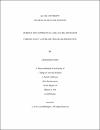CURRENT DEVELOPMENTS IN TAJIK-GCC RELATIONS FOR FOREIGN POLICY AND TRADE FROM TAJIK PERSPECTIVE
Abstract
With the collapse of the Soviet Union in 1991, Central Asian states faced several
challenges concerning their political autonomy in a globalized economic system.
Foreign policy formation was top priority for acquiring international recognition.
Leadership in Tajikistan focused political efforts on recruiting Arab Muslims in
Afghanistan as allies based on religious and cultural ties. Relations with the
neighboring countries in the Gulf Cooperation Council (GCC) currently depend on
foreign policy for national interests particularly after the terrorist attacks of
September 11, 2001. Tajikistan implemented an “open door” policy that led the
relatively new nation to gain international recognition and strengthen relationships
with GCC countries. Tajikistan and GCC countries currently work in collaboration to
develop a “pan-Islamic” pattern of international relations. However, in recognizing its
unique form of independence, political leaders in Tajikistan engage in risky political
behaviors that effectively damage national reputation. The results of this study
indicate that while Tajikistan has the potential to play a critical role for economic
development in Central Asia, its geography may require placing restrictions on
imports for agricultural goods. Moreover, labor migration to GCC countries like the
United Arab Emirates and Qatar suggest that future studies should evaluate the effects
of FDI and remittance flows from host to home country in shaping foreign policy
directions. The political and economic future of Tajikistan and GCC countries
depends on the leveraging of consumer markets while striking an important balance
in foreign policy developments.
DOI/handle
http://hdl.handle.net/10576/5102Collections
- Gulf Studies [68 items ]


